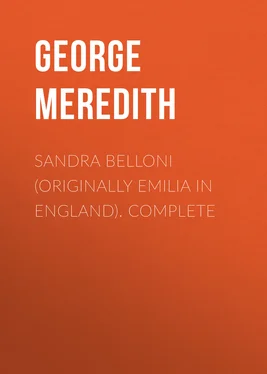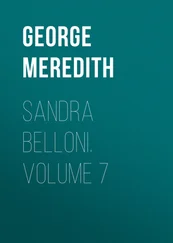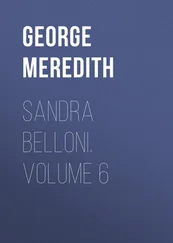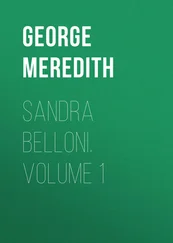George Meredith - Sandra Belloni (originally Emilia in England). Complete
Здесь есть возможность читать онлайн «George Meredith - Sandra Belloni (originally Emilia in England). Complete» — ознакомительный отрывок электронной книги совершенно бесплатно, а после прочтения отрывка купить полную версию. В некоторых случаях можно слушать аудио, скачать через торрент в формате fb2 и присутствует краткое содержание. Жанр: foreign_prose, literature_19, foreign_antique, на английском языке. Описание произведения, (предисловие) а так же отзывы посетителей доступны на портале библиотеки ЛибКат.
- Название:Sandra Belloni (originally Emilia in England). Complete
- Автор:
- Жанр:
- Год:неизвестен
- ISBN:нет данных
- Рейтинг книги:4 / 5. Голосов: 1
-
Избранное:Добавить в избранное
- Отзывы:
-
Ваша оценка:
- 80
- 1
- 2
- 3
- 4
- 5
Sandra Belloni (originally Emilia in England). Complete: краткое содержание, описание и аннотация
Предлагаем к чтению аннотацию, описание, краткое содержание или предисловие (зависит от того, что написал сам автор книги «Sandra Belloni (originally Emilia in England). Complete»). Если вы не нашли необходимую информацию о книге — напишите в комментариях, мы постараемся отыскать её.
Sandra Belloni (originally Emilia in England). Complete — читать онлайн ознакомительный отрывок
Ниже представлен текст книги, разбитый по страницам. Система сохранения места последней прочитанной страницы, позволяет с удобством читать онлайн бесплатно книгу «Sandra Belloni (originally Emilia in England). Complete», без необходимости каждый раз заново искать на чём Вы остановились. Поставьте закладку, и сможете в любой момент перейти на страницу, на которой закончили чтение.
Интервал:
Закладка:
“My own brother! I expect no confidences, but a whisper warns me that you have not been to Stornley twice without experiencing the truth of our old discovery, that the Poles are magnetic? Why should we conceal it from ourselves, if it be so? I think it a folly, and fraught with danger, for people not to know their characteristics. If they attract, they should keep in a circle where they will have no reason to revolt at, or say, repent of what they attract. My argumentative sister does not coincide. If she did, she would lose her argument.
“Adieu! Such is my dulness, I doubt whether I have made my meaning clear.
“Your thrice affectionate
“Adela.
“P.S.—Lady Gosstre has just taken Emilia to Richford for a week. Papa starts for Bidport to-morrow.”
This short and rather blunt exercise in Fine Shades was read impatiently by Wilfrid. “Why doesn’t she write plain to the sense?” he asked, with the usual injustice of men, who demand a statement of facts, forgetting how few there are to feed the post; and that indication and suggestion are the only language for the multitude of facts unborn and possible. Twilight best shows to the eye what may be.
“I suppose I must go down there,” he said to himself, keeping a meditative watch on the postscript, as if it possessed the capability of slipping away and deceiving him. “Does she mean that Cornelia sees too much of this man Barrett? or, what does she mean?” And now he saw meanings in the simple passages, and none at all in the intricate ones; and the double-meanings were monsters that ate one another up till nothing remained of them. In the end, however, he made a wrathful guess and came to a resolution, which brought him to the door of the house next day at noon. He took some pains in noting the exact spot where he had last seen Emilia half in moonlight, and then dismissed her image peremptorily. The house was apparently empty. Gainsford, the footman, gave information that he thought the ladies were upstairs, but did not volunteer to send a maid to them. He stood in deferential footman’s attitude, with the aspect of a dog who would laugh if he could, but being a footman out of his natural element, cannot.
“Here’s a specimen of the new plan of treating servants!” thought Wilfrid, turning away. “To act a farce for their benefit! That fellow will explode when he gets downstairs. I see how it is. This woman, Chump, is making them behave like schoolgirls.”
He conceived the idea sharply, and forthwith, without any preparation, he was ready to treat these high-aspiring ladies like schoolgirls. Nor was there a lack of justification; for when they came down to his shouts in the passage, they hushed, and held a finger aloft, and looked altogether so unlike what they aimed at being, that Wilfrid’s sense of mastery became almost contempt.
“I know perfectly what you have to tell me,” he said. “Mrs. Chump is here, you have quarrelled with her, and she has shut her door, and you have shut yours. It’s quite intelligible and full of dignity. I really can’t smother my voice in consequence.”
He laughed with unnecessary abandonment. The sensitive young women wanted no other schooling to recover themselves. In a moment they were seen leaning back and contemplating him amusedly, as if he had been the comic spectacle, and were laughing for a wager. There are few things so sour as the swallowing of one’s own forced laugh. Wilfrid got it down, and commenced a lecture to fill the awkward pause. His sisters maintained the opera-stall posture of languid attention, contesting his phrases simply with their eyebrows, and smiling. He was no match for them while they chose to be silent: and indeed if the business of life were conducted in dumb show, women would beat men hollow. They posture admirably. In dumb show they are equally good for attack and defence. But this is not the case in speech. So, when Arabella explained that their hope was to see Mrs. Chump go that day, owing to the rigorous exclusion of all amusement and the outer world from the house, Wilfrid regained his superior footing and made his lecture tell. In the middle of it, there rang a cry from the doorway that astonished even him, it was so powerfully Irish.
“The lady you have called down is here,” said Arabella’s cold glance, in answer to his.
They sat with folded hands while Wilfrid turned to Mrs. Chump, who advanced, a shock of blue satin to the eye, crying, on a jump: “Is ut Mr. Wilfrud?”
“It’s I, ma’am.” Wilfrid bowed, and the censorious ladies could not deny that, his style was good, if his object was to be familiar. And if that was his object, he was paid for it. A great thick kiss was planted on his cheek, with the motto: “Harm to them that thinks ut.”
Wilfrid bore the salute like a man who presumes that he is flattered.
“And it’s you!” said Mrs. Chump. “I was just off. I’m packed, and bonnutted, and ready for a start; becas, my dear, where there’s none but women, I don’t think it natural to stop. You’re splendid! How a little fella like Pole could go and be father to such a mighty big son, with your bit of moustache and your blue eyes! Are they blue or a bit of grey in ‘em?” Mrs. Chump peered closely. “They’re kill’n’, let their colour be anyhow. And I that knew ye when ye were no bigger than my garter! Oh, sir! don’t talk of ut; I’ll be thinkin’, of my coffin. Ye’re glad to see me? Say, yes. Do!”
“Very glad,” quoth Wilfrid.
“Upon your honour, now?”
“Upon my honour!”
“My dears” (Mrs. Chump turned to the ladies), “I’ll stop; and just thank your brother for’t, though you can’t help being garls.”
Reduced once more to demonstrate like schoolgirls by this woman, the ladies rose together, and were retiring, when Mrs. Chump swung round and caught Arabella’s hand. “See heer,” she motioned to Wilfrid. Arabella made a bitter effort to disengage herself. “See, now! It’s jeal’sy of me, Mr. Wilfrud, becas I’m a widde and just an abom’nation to garls, poor darlin’s! And twenty shindies per dime we’ve been havin’, and me such a placable body, if ye’ll onnly let m’ explode. I’m all powder, avery bit! and might ha’ been christened Saltpetre, if born a boy. She hasn’t so much as a shot to kill a goose, says Chump, poor fella! But he went, anyway. I must kiss somebody when I talk of ‘m. Mr. Wilfrud, I’ll take the girls, and entitle myself to you.”
Arabella was the first victim. Her remonstrance was inarticulate. Cornelia’s “Madam!” was smothered. Adela behaved better, being more consciously under Wilfrid’s eye; she prepared her pocket-handkerchief, received the salute, and deliberately effaced it.
“There!” said Mrs. Chump; “duty to begin with. And now for you, Mr. Wilfrud.”
The ladies escaped. Their misery could not be conveyed to the mind. The woman was like a demon come among them. They felt chiefly degraded, not by her vulgarity, but by their inability to cope with it, and by the consequent sickening sense of animal inefficiency—the block that was put to all imaginative delight in the golden hazy future they figured for themselves, and which was their wine of life. An intellectual adversary they could have combated; this huge brogue-burring engine quite overwhelmed them. Wilfrid’s worse than shameful behaviour was a common rallying-point; and yet, so absolutely critical were they by nature, their blame of him was held mentally in restraint by the superior ease of his manner as contrasted with their own lamentably silly awkwardness. Highly civilized natures do sometimes, and keen wits must always, feel dissatisfied when they are not on the laughing side: their dread of laughter is an instinctive respect for it.
Dinner brought them all together again. Wilfrid took his father’s seat, facing his Aunt Lupin, and increased the distress of his sisters by his observance of every duty of a host to the dreadful intruder, whom he thus established among them. He was incomprehensible. His visit to Stornley had wrought in him a total change. He used to like being petted, and would regard everything as right that his sisters did, before he went there; and was a languid, long-legged, indifferent cavalier, representing men to them: things made to be managed, snubbed, admired, but always virtually subservient and in the background. Now, without perceptible gradation, his superiority was suddenly manifest; so that, irritated and apprehensive as they were, they could not, by the aid of any of their intricate mental machinery, look down on him. They tried to; they tried hard to think him despicable as well as treacherous. His style was too good. When he informed Mrs. Chump that he had hired a yacht for the season, and added, after enlarging on the merits of the vessel, “I am under your orders,” his sisters were as creatures cut in twain—one half abominating his conduct, the other approving his style. The bow, the smile, were perfect. The ladies had to make an effort to recover their condemnatory judgement.
Читать дальшеИнтервал:
Закладка:
Похожие книги на «Sandra Belloni (originally Emilia in England). Complete»
Представляем Вашему вниманию похожие книги на «Sandra Belloni (originally Emilia in England). Complete» списком для выбора. Мы отобрали схожую по названию и смыслу литературу в надежде предоставить читателям больше вариантов отыскать новые, интересные, ещё непрочитанные произведения.
Обсуждение, отзывы о книге «Sandra Belloni (originally Emilia in England). Complete» и просто собственные мнения читателей. Оставьте ваши комментарии, напишите, что Вы думаете о произведении, его смысле или главных героях. Укажите что конкретно понравилось, а что нет, и почему Вы так считаете.












